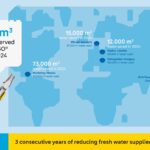- LEGO reduced global water consumption by 56,000 m³ in 2024, continuing a three-year downward trend.
- Monterrey’s advanced treatment facility slashed freshwater and well-water use by 85,055 m³.
- LEED Gold-certified Vietnam site eliminated water cooling systems in favor of air-cooling and condensate reuse.
LEGO Group has cut its global factory water consumption for the third consecutive year, achieving a total usage of 753,711 m³ in 2024—56,000 m³ less than the previous year. The reduction is part of the company’s broader environmental strategy to decouple growth from resource impact, focusing on carbon, energy, water, and waste.
“We are committed to minimising the impact of our operations on the environment,” LEGO stated. “Our focus is on decoupling our growth from our environmental footprint.”
While not all factories saw year-over-year reductions, the biggest gains came from site-specific solutions:
- In Monterrey, Mexico, a state-of-the-art treatment facility now recycles municipal wastewater, HVAC condensate, and rainwater. The result: an 85,055 m³ drop in freshwater and well-water consumption—equal to nearly 34 Olympic-sized swimming pools.
- In Billund, Denmark, 88% of water used for cooling towers in 2023 came from shallow groundwater, thanks to an in-house capture system.
- At the new LEED Gold-certified factory in Binh Duong, Vietnam, LEGO replaced traditional water cooling with an air-cooling system, cut water use through efficient fixtures, and began reusing condensate water.
RELATED ARTICLE: LEGO Introduces Tires Made with 30% Recycled Materials
The LEGO Group acknowledges the importance of localized innovation, especially given the varying climates and water stress levels in regions where it operates.
“We recognise that there is no one-size-fits-all approach to reduce our freshwater use,” LEGO noted. “Therefore, we focus on three key strategies: increasing efficiency, finding alternative sources, and establishing treatment facilities.”
The company emphasized that while their water must meet high standards to protect machinery, it doesn’t need to be potable—opening the door for broader use of alternative sources.
Looking ahead, LEGO remains committed to scaling sustainable solutions across its global footprint:
“Reducing the impact of our operations, whilst reaching more children with LEGO play remains an important challenge,” the company said. “We will continue to look for new ways to reduce our impact across water, waste and carbon.”
Follow ESG News on LinkedIn
The post LEGO Cuts Global Water Use for Third Consecutive Year, Saving 56,000 m³ in 2024 appeared first on ESG News.
